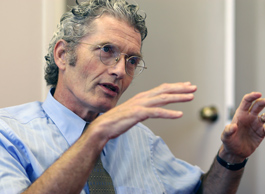WASHINGTON, D.C. — Wabash College is among 11 college and university campuses selected to participate in "Deliberation about Things That Matter," a series of events sponsored by Phi Beta Kappa for teaching and learning deliberative skills through the discussion of major issues of meaning or value.
For 230 years, Phi Beta Kappa has advocated excellence in the liberal arts and sciences. "Deliberation about Things that Matter" emphasizes the first purpose of the Society: to encourage the application of learning and scholarship in the examination of important topics.
 "This is an affirmation of an important characteristic of Wabash intellectual life, namely the importance of critical, deliberative thought," Dean of the College Gary Phillips said. "Wabash joins a select company of institutions committed to deliberative inquiry and the life of the mind. We have an opportunity here to extend and deepen what is best about Senior Colloquium, and to affirm the importance of deliberative reflection as part of the day-to-day activity of Wabash faculty and students.
"This is an affirmation of an important characteristic of Wabash intellectual life, namely the importance of critical, deliberative thought," Dean of the College Gary Phillips said. "Wabash joins a select company of institutions committed to deliberative inquiry and the life of the mind. We have an opportunity here to extend and deepen what is best about Senior Colloquium, and to affirm the importance of deliberative reflection as part of the day-to-day activity of Wabash faculty and students.
"A Colloquium-like conversation among interested Wabash faculty and students will enrich faculty and students alike. It is what liberal arts learning is all about."
Events on the following campuses will be funded by a grant of $100,000 to the Phi Beta Kappa Society from the Teagle Foundation.
The participating colleges include: Arizona State University, Hendrix College, Colorado College, Stetson University, Wabash, Drake University, Hope College, Carnegie Mellon University, University of Texas at Austin, University of Vermont, and Washington State University.
The coordinating body on each campus is a partnership between the Phi Beta Kappa chapter and a campus curricular authority, such as the Honors College, the Dean of Arts and Sciences or the Curriculum Committee.
In all cases, the partnerships will not only engage students and faculty in deliberative activities, but they will also observe and analyze those activities with the aim of coming to understand what happens when people deliberate well, how people learn the skills involved and how they acquire the disposition to use those skills.
The Society’s intent is to have an impact on these campuses and, following the project, to produce a white paper of general interest on this topic in order to spread what we have learned to others.
The Society also aims to strengthen the role of the chapters involved on their campuses and to raise the visibility of Phi Beta Kappa as a champion of the liberal arts and sciences.
Phi Beta Kappa has awarded chapters at 276 institutions and has half a million members throughout the country. Its mission is to champion education in the liberal arts and sciences, to recognize academic excellence, and to foster freedom of thought and expression. Among its programs are academic and literary awards, lectureships, a fellowship, a professorship, and publication of The American Scholar, an award-winning quarterly journal.